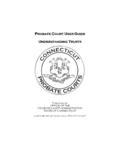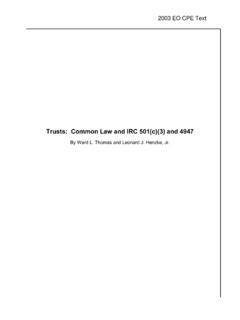Transcription of What you need to know about revocable living trusts
1 revocable living TrustsA washington State Bar association consumer information guidecreated in cooperation with the WSBA Real Property, Probate & trust SectionRevocable living TrustsWhat you need to know about revocable living trustsWhat is a revocable living trust ?A revocable living trust is a written agreement in which the trustor, the person who creates the trust , names a trustee and governs the manage-ment of trust assets during the trus-tor s lifetime and upon the trustor s death. Establishing the revocable liv-ing trust (RLT) essentially creates a legal trust entity, to which the trustor transfers ownership of some or all of his or her assets.
2 RLT-owned assets typically include the trustor s resi-dence and financial accounts. Usually retirement accounts such as IRAs are not transferred to the RLT. As with any estate planning document, each situation is unique and the RLT-based plan should be tailored to the individual s particular circumstances, assets and goals. (Although this re-source refers to a single trustor, often couples create a revocable living trust together as their joint estate planning document, in which case both spous-es or partners are usually the trustors, together. Note also that another word for trustor that is sometimes used in trust agreements is grantor; but only the term trustor is used herein for simplicity s sake.)
3 Who should serve as trustee of a revo-cable living trust ?Typically, a trustor serves as the trust -ee immediately and throughout the trustor s lifetime. The trustee is re-sponsible for carrying out the terms of the RLT. It is important for the trustor to designate at least one alternate to serve in the event of the trustor s inca-pacity or death. The alternate trustee is usually referred to as the succes-sor trustee. If a trustor is elderly or already facing a debilitating illness at the outset, he or she may choose to name a third party as trustee im-mediately.
4 Depending on the circum-stances, a trustor may name a family member, friend, colleague, and/or a professional fiduciary, such as a trust company, as successor trustee(s). How is a revocable living trust differ-ent from a last will and testament?Both wills and RLTs give instructions about the transfer of assets after death. However, a will is essentially sits dor-mant until the testator the person who created the will passes away. If someone dies with a will instead of a RLT a court probate proceeding is often required. By contrast, a RLT agreement creates a legal trust entity upon signing, and that trust becomes the owner of some or all of the trus-tor s assets during the trustor s life.
5 If a RLT is maintained properly, then a court probate proceeding may not be necessary when the trustor dies. The RLT is an alternative to a will; a per-son has one or the other as their fun-damental estate planning document. However, usually a simple will called a pour-over will accompanies the RLT, to capture any assets outside of the much does a revocable living trust cost?The cost of establishing a RLT varies greatly, depending upon where one lives, attorney fees, and the level of complexity of the trustor s situation.
6 In addition, usually RLTs are created as part of a comprehensive estate plan revocable living Truststhat includes other documents such as powers of attorney. Some attorneys perform estate planning work on a flat fee basis, while others charge hourly rates. If cost is a concern, it is usually a good idea to compare cost estimates from two or more a revocable living trust be changed?The terms of a RLT can be changed at any time, which is usually accom-plished by amending the document or, if the changes are substantial, by restat-ing and amending the trust document in its entirety.
7 Moreover, a RLT is, as the name states , revocable , and may be cancelled in full at any time before the trustor s often hear mention of trusts . How does a revocable living trust compare to other types of trusts ?There are many different types of trusts , some of which are created dur-ing the trustor s lifetime and others that are created only after death. Different trusts have different purposes, such as minimizing estate taxes or providing for a disabled family member. In gen-eral, the RLT s purpose is to provide for a relatively straightforward and private process for transferring assets after a revocable living trust protect assets from potential lawsuits and creditors?
8 No; contrary to popular belief, the transfer of assets to a RLT does not provide meaningful protection from potential lawsuits and there tax reasons to have a revo-cable living trust instead of a will?No, there are no tax advantages to us-ing a RLT instead of a will. The cre-ation of a revocable living trust has no effect on the trustor s personal income tax situation; all income and expenses are reported on the trustor s regular, individual tax return. Also, the same gift and estate tax planning can be ac-complished with a RLT as with a will. (In 2013, an individual s estate is ex-empt from washington s estate tax if the net estate is less than $2 million, and exempt from federal estate tax if the net estate is less than $ mil-lion.)
9 These exemption amounts will increase over time because, under current law, both the state and federal exemptions are indexed for inflation. In addition, and in general, estate tax laws often change.)What are the advantages of a revo-cable living trust compared to a will?RLTs offer some advantages, includ-ing: Private transfer of assets to benefi-ciaries after death instead of pro-bate, which creates a public record; May avoid (if properly created and maintained) the requirements and expenses of a probate; Designation of another person to manage one s assets during life is easy, if are the disadvantages of a revo-cable living trust compared to a will?
10 There are also disadvantages to RLTs, including: RLTs are not as common as wills in washington and their unfamiliar-ity can complicate matters after the trustor s death; RLTs are usually more expensive to establish than a will because of the time involved in ensuring that appropriate assets are transferred to the trust ; Administering a RLT without a probate does not provide the helpful and protective aspects of probate, which include creditor deadlines and a court venue for ad-dressing disputes; Ongoing maintenance is required to ensure that appropriate assets are held in and new assets are acquired by the have I heard from friends or relatives who live in other states that a revocable living trust is superior to a will?







